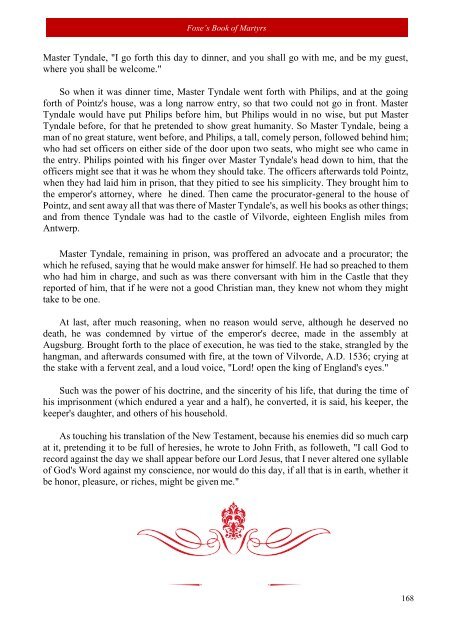Foxe - The Book of Martyrs
The mystery of history is not completely dark, since it is a veil which only partially conceals the creative activity and spiritual forces and the operation of spiritual laws. It is commonplace to say that the blood of the martyrs is the seed of the Church yet what we are asserting is simply that individual acts of spiritual decision bear social fruit …For the great cultural changes and historic revolutions that decide the fate of nations or the character of an age is the cumulative result of a number of spiritual decisions … the faith and insight, or the refusal and blindness, of individuals. No one can put his finger on the ultimate spiritual act that tilts the balance, and makes the external order of society assume a new form… Persecution, powerless to destroy or even to shake this new community, made it only the more sensible of its own strength, and pressed it into a more compact body.
The mystery of history is not completely dark, since it is a veil which only partially conceals the creative activity and spiritual forces and the operation of spiritual laws. It is commonplace to say that the blood of the martyrs is the seed of the Church yet what we are asserting is simply that individual acts of spiritual decision bear social fruit …For the great cultural changes and historic revolutions that decide the fate of nations or the character of an age is the cumulative result of a number of spiritual decisions … the faith and insight, or the refusal and blindness, of individuals. No one can put his finger on the ultimate spiritual act that tilts the balance, and makes the external order of society assume a new form… Persecution, powerless to destroy or even to shake this new community, made it only the more sensible of its own strength, and pressed it into a more compact body.
You also want an ePaper? Increase the reach of your titles
YUMPU automatically turns print PDFs into web optimized ePapers that Google loves.
<strong>Foxe</strong>’s <strong>Book</strong> <strong>of</strong> <strong>Martyrs</strong><br />
Master Tyndale, "I go forth this day to dinner, and you shall go with me, and be my guest,<br />
where you shall be welcome."<br />
So when it was dinner time, Master Tyndale went forth with Philips, and at the going<br />
forth <strong>of</strong> Pointz's house, was a long narrow entry, so that two could not go in front. Master<br />
Tyndale would have put Philips before him, but Philips would in no wise, but put Master<br />
Tyndale before, for that he pretended to show great humanity. So Master Tyndale, being a<br />
man <strong>of</strong> no great stature, went before, and Philips, a tall, comely person, followed behind him;<br />
who had set <strong>of</strong>ficers on either side <strong>of</strong> the door upon two seats, who might see who came in<br />
the entry. Philips pointed with his finger over Master Tyndale's head down to him, that the<br />
<strong>of</strong>ficers might see that it was he whom they should take. <strong>The</strong> <strong>of</strong>ficers afterwards told Pointz,<br />
when they had laid him in prison, that they pitied to see his simplicity. <strong>The</strong>y brought him to<br />
the emperor's attorney, where he dined. <strong>The</strong>n came the procurator-general to the house <strong>of</strong><br />
Pointz, and sent away all that was there <strong>of</strong> Master Tyndale's, as well his books as other things;<br />
and from thence Tyndale was had to the castle <strong>of</strong> Vilvorde, eighteen English miles from<br />
Antwerp.<br />
Master Tyndale, remaining in prison, was pr<strong>of</strong>fered an advocate and a procurator; the<br />
which he refused, saying that he would make answer for himself. He had so preached to them<br />
who had him in charge, and such as was there conversant with him in the Castle that they<br />
reported <strong>of</strong> him, that if he were not a good Christian man, they knew not whom they might<br />
take to be one.<br />
At last, after much reasoning, when no reason would serve, although he deserved no<br />
death, he was condemned by virtue <strong>of</strong> the emperor's decree, made in the assembly at<br />
Augsburg. Brought forth to the place <strong>of</strong> execution, he was tied to the stake, strangled by the<br />
hangman, and afterwards consumed with fire, at the town <strong>of</strong> Vilvorde, A.D. 1536; crying at<br />
the stake with a fervent zeal, and a loud voice, "Lord! open the king <strong>of</strong> England's eyes."<br />
Such was the power <strong>of</strong> his doctrine, and the sincerity <strong>of</strong> his life, that during the time <strong>of</strong><br />
his imprisonment (which endured a year and a half), he converted, it is said, his keeper, the<br />
keeper's daughter, and others <strong>of</strong> his household.<br />
As touching his translation <strong>of</strong> the New Testament, because his enemies did so much carp<br />
at it, pretending it to be full <strong>of</strong> heresies, he wrote to John Frith, as followeth, "I call God to<br />
record against the day we shall appear before our Lord Jesus, that I never altered one syllable<br />
<strong>of</strong> God's Word against my conscience, nor would do this day, if all that is in earth, whether it<br />
be honor, pleasure, or riches, might be given me."<br />
168


















